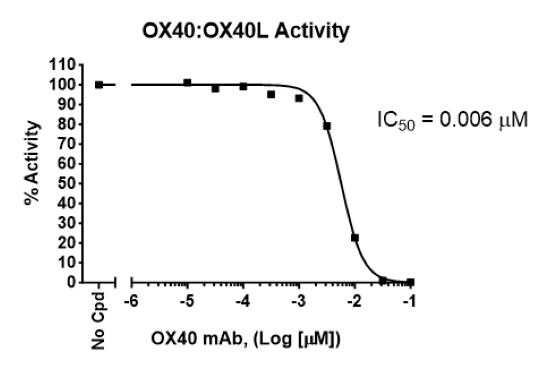OX40[Biotinylated]:OX40L Inhibitor Screening Assay Kit
The OX40[Biotinylated]:OX40L Inhibitor Screening Assay Kit is designed to measure the binding of OX40 to OX40L (OX40 ligand) for screening and profiling applications. The OX40[Biotinylated]:OX40L Inhibitor Screening Assay Kit comes in a convenient 96-well format, with enough recombinant purified biotinylated OX40 (amino acids 29-216), OX40L (amino acids 51-183), blocking and assay buffer and detection reagents for 100 enzyme reactions.
Need us to run inhibitor screens or profile your compounds against OX40[Biotinylated]:OX40L? Check out our Immunotherapy Biochemical Screening Services.
- 1x PBS (phosphate buffer saline) Buffer
- Luminometer or microplate reader capable of reading chemiluminescence
- Adjustable micropipettor and sterile tips
- Rotating or rocker platform
| Catalog # | Name | Amount | Storage |
| 71185 | OX40L (CD252), His-Tag (Human)* | 25 µg | -80°C |
| 71310 | OX40 (CD134), Biotin-Labeled, His-Tag (Human)* | 3 µg | -80°C |
| 79311 | 3x Immuno Buffer 1 | 50 ml | -20°C |
| 79728 | Blocking Buffer 2 | 50 ml | +4°C |
| 79742 | Streptavidin-HRP | 10 µl | +4°C |
| 79670 | ELISA ECL Substrate A (translucent bottle) | 6 ml | Room Temp |
| ELISA ECL substrate B (brown bottle) | 6 ml | Room Temp |
|
| 79699 | 96-well white microplate | 1 | Room Temp |
*The concentration of the protein is lot-specific and will be indicated on the tube.
OX40, also known as CD134, is a co-stimulatory receptor, of the TNF (tumor necrosis factor) receptor family, expressed on the surface of T cells. Binding of OX40 to its ligand, OX40L (also known as CD252), potentiates T cell activation, differentiation, proliferation, survival and T cell effector function. OX40L is present in NK cells, participating in their activation and cytotoxicity profile, and dendritic cells. OX40 can bind to members of the TRAF (TNFR associated factor) family of proteins, which can then regulate the NF-κF (nuclear factor kappa-light chain enhancer of activated B cells) signaling pathway. OX40 and OX40L can be found in cancer cells, such as AML (acute myeloid leukemia) and breast cancer cells. Studies have shown that OX40 agonists can increase anti-tumor immunity and improve tumor-free survival in pre-clinical studies. Alternatively, OX40 antagonists offer potential as therapeutics for inflammatory diseases. The development of new modulators of the OX40/OX40L activity are promising therapies for patients suffering from solid tumors or auto-immune disorders.
Peng K., et al., 2014 AAPS J. 16(4): 625–633.
Marconato M., et al., 2022 Scientific Reports 12: 15856.


